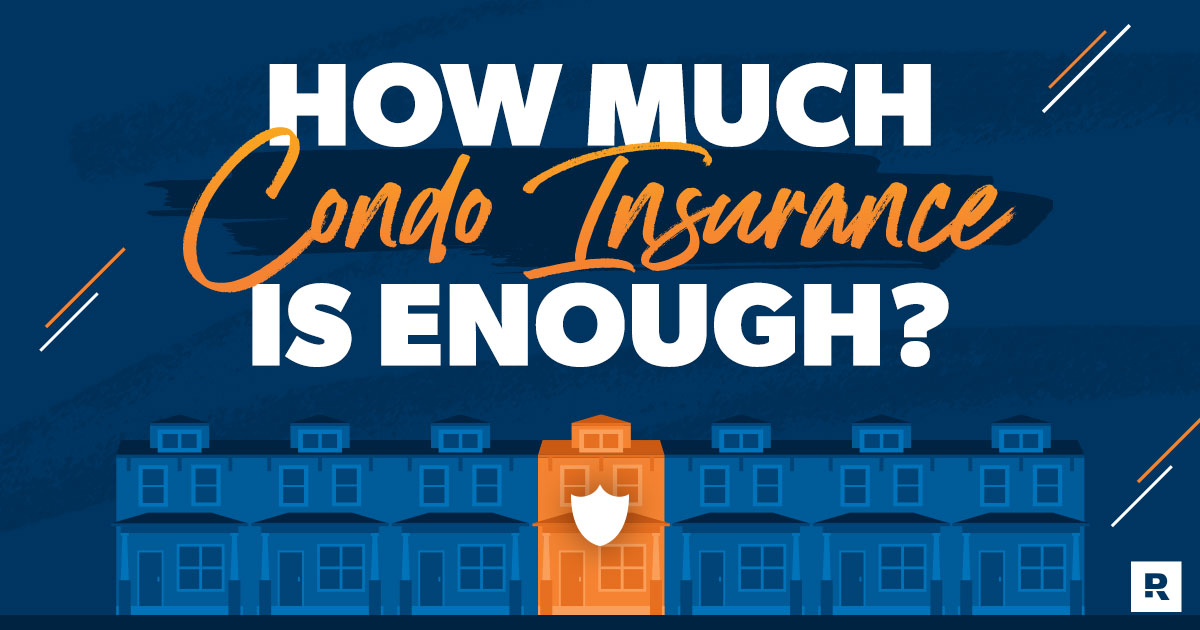How Much Condo Insurance Do I Need?
7 Min Read | Nov 25, 2024

You’ve scrimped and saved, planned and shopped, and now you finally have that condo you’ve always dreamed of. Whether it’s on a sun-kissed beach, in the snowcapped mountains or in bustling downtown Chicago, you couldn’t be happier. But now you need to make sure your investment is protected.
That’s where condo insurance comes swooping in like an insurance Superman (not salesman!) to save the day. But it can be hard to know exactly how much you need. Don’t worry. If you’re wondering, How much condo insurance do I need?—we’ve got you covered.
What Is Condo Insurance?
Condo insurance is a type of property insurance that protects your personal belongings if they are stolen or damaged. It also pays for repairs to your condo unit if disaster strikes and gives you liability protection if someone is injured on your property.
Condo insurance is also called HO-6 insurance. Traditional homeowners insurance policies are called HO-3 and renters insurance is called HO-4. (Did someone create these labels just to make insurance even more confusing?)
Some condo owners mistakenly assume their homeowners association (HOA) insurance covers their unit and personal belongings. Nope. Sorry. HOA insurance only covers the building and common areas.
Estimating How Much Condo Insurance You Need
Condo insurance covers a lot of events that could potentially keep you from achieving your financial goals. With the right amount of coverage, you’ll sleep better at night knowing that big storm will simply be an inconvenience and not a budget-breaker.
The amount of condo insurance you need depends on your specific situation, including what type of master insurance policy your HOA has.
Here’s a step-by-step guide to estimating your condo insurance needs.
Check what your HOA Insurance Covers
Ask your HOA for a copy of their insurance declaration page. This will give you a better idea of what’s covered by your HOA and what gaps you’ll need to fill with your own condo insurance.
Bare walls coverage protects the exterior of the condo building, not your unit. It covers fixtures and furnishings inside common areas as well as property owned by the HOA. If your HOA insurance is bare walls, you’ll be responsible for covering the inside of your condo.
Single entity coverage is the most common and is sometimes called walls-in or studs-in. It provides the same protection as bare walls, but also covers permanent fixtures (like cabinets) that are outside the condo unit’s walls.
All-in coverage protects the entire interior of your condo unit. Sometimes this includes renovations and improvements you’ve made. If your HOA has an all-in master policy, you usually don’t need your own dwelling coverage policy.
Calculating How Much Condo Insurance You Need
Now that we’ve determined what you’re responsible for insuring, let’s take a look at how much coverage you might need.
Dwelling Coverage
Dwelling coverage, also called building property coverage, pays to repair or rebuild your condo if it’s damaged from a covered event (like a fire or explosion).
To figure out how much dwelling coverage you need, start by researching local construction costs. This will give you an idea of how much it would cost to rebuild your condo. Also check with your mortgage provider (if you don’t own your condo outright) and see if there is a dwelling coverage requirement. For instance, if your lender requires dwelling coverage at 25% of the property value, and your condo is worth $1 million, you would need dwelling coverage of at least $250,000.
Protect your home and your budget with the right coverage!
A good rule of thumb for condo insurance is to get enough dwelling coverage to cover the full cost of rebuilding your condo—not simply what you paid for it. Otherwise you could be on the hook for big bucks. Once you get the right policy in place, it’s also a good idea to check your coverage at least once a year to make sure it’s still enough.
Personal Property Protection
Personal property coverage pays to replace things like clothes, furniture, appliances and electronics if they’re lost, stolen or destroyed. Do an inventory of everything you own—everything, people!—and calculate how much each item is worth (a good weekend project!). Many people underestimate the value of their things, so be thorough. If you own art, jewelry or collectibles that are worth more, you can increase your limits to protect your priciest possessions.
You should also decide if you want actual cash value (ACV) or replacement cost value (RCV). Actual cash value factors in depreciation when your insurer reimburses you for that stolen TV. So if you bought the TV 10 years ago for $800, and now it’s only worth $200, you’ll get a check for $200 (ouch!). On the other hand, replacement cost coverage pays for the cost of a brand-new TV (nice!).
Liability Coverage
Liability insurance protects you if that cranky neighbor slips and breaks their ankle while visiting and decides to sue. Or if your dog wants to prove her bite is worse than her bark and bites one of your guests. Liability will help pay for legal fees, settlements, court judgments and medical expenses if you’re found liable for an accident on your property.
Liability coverage typically starts around $100,000, but this might not be enough for you. You should have enough to protect your assets that are at risk if you lost an expensive lawsuit. Add up what you have in your savings account and investment accounts, including vehicles and other assets and make sure your liability is enough to cover your at-risk assets. And if you have a higher net worth, you may also want to consider umbrella insurance for even higher liability limits.
Additional Living Expenses
Another important part of condo insurance is additional living expenses (ALE) coverage. ALE covers costs that come up if you need to temporarily live somewhere else while your condo is being repaired. Hotels and restaurants can add up really fast. So be sure your ALE coverage is enough to cover your needs.
Loss Assessment
Also called special assessment coverage, loss assessment kicks in if your HOA insurance policy hits its limits. Let’s say a Category 4 hurricane swept through and destroyed your condo building. Your HOA could require each condo owner to share costs over and above their policy limit. Loss assessment will help pay your share.
Depending on where you live, you might also need to get a few add-ons to your condo insurance policy. For example, if your condo is in Florida overlooking the beautiful Gulf of Mexico, you should look into hurricane insurance. Standard condo insurance policies don’t cover all natural disasters like flooding, earthquakes and hurricanes. You’ll need an extra layer of coverage if your condo is in an area that’s prone to extreme weather.
How to Find Condo Insurance
The cost of condo insurance is definitely worth the peace of mind and financial protection it provides. When it comes to one of your biggest investments—your condo—you can’t leave things to chance. You need to make sure your unit and personal belongings are covered.
That’s why we recommend working with one of our insurance agents who is part of our Endorsed Local Providers (ELP) program. They are RamseyTrusted and can look at your specific situation to see how much condo insurance you really need.
Interested in learning more about homeowners insurance?
Sign up to receive helpful guidance and tools.



